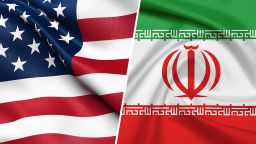The US State Department on Tuesday praised the release of Nizar Zakka after nearly four years of detention in Iran, expressing “hope” that it could be “a positive sign for American detainees” in that country.
Zakka, a Lebanese citizen with permanent US residency, was released after being held in Tehran for “espionage” since 2015. The 52-year-old was arrested in September of that year “while attending a conference on women and sustainable development,” according to Iran’s semi-official state news agency Tasnim. He was convicted on espionage charges and sentenced to 10 years in prison in 2016.
Zakka, speaking with Al Arabiya following his release, said he was “subjected to all kinds of torture from the Iranians” when he was first arrested. He told the news outlet that the torture became psychological.
“I can’t describe it. It’s very hard to describe,” he said of his detention in Iran’s Evin prison.
In a statement, a State Department spokesperson hailed Zakka’s release as “without a doubt a great day for Mr. Zakka, his family, and all those who have supported him during his unlawful imprisonment.”
The spokesperson thanked Lebanese officials, including President Michel Aoun, Foreign Minister Gebran Bassil and the Foreign Ministry for “their continued efforts to press the Iranian regime for Zakka’s release.”
“Their persistent involvement and advocacy on behalf of Mr. Zakka was critical in his safe return,” the spokesperson said.
The State Department called for “the Iranian regime to release missing and wrongfully detained American citizens including Bob Levinson, Siamak Namazi, Xiyue Wang and others.”
Zakka’s release comes amid a weeks of heightened tensions between the US and Iran. In an exclusive interview with CNN last month, Zarif warned the US was “playing a very, very dangerous game” by boosting its military presence in the region. And while US officials, including President Donald Trump, have voiced openness to speaking with Iran, Foreign Minister Mohammad Javad Zarif has said his country won’t negotiate with unless the US shows Tehran “respect” by honoring its commitments under the disputed nuclear deal.
In late April, Zarif offered to exchange prisoners with the US, saying, “Exchange them… I am ready to do it, and I have authority to do it.” In response, a State Department spokesperson said that “the Iranian regime can demonstrate its seriousness regarding consular issues, including Iranians who have been indicted or convicted of criminal violations of US sanctions laws, by releasing innocent US persons immediately.”
CNN’s Nada Altaher and Ghazi Balkiz contributed to this report.





